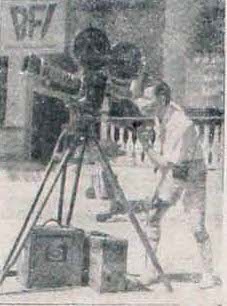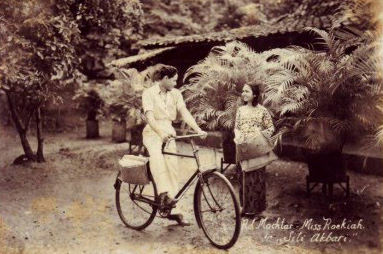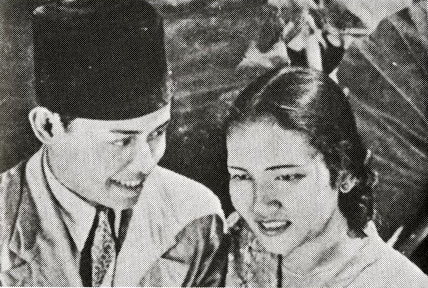|
Kartolo
Raden Mas Kartolo (before 1918 – 18 January 1949) was an Indonesian actor and songwriter. Born in Yogyakarta to a noble family, he entered the theatre and married the actress Roekiah around 1933. The two, living in Batavia (now Jakarta) acted in numerous movies together, starting with the 1938 hit ''Terang Boelan''. However, Roekiah was always cast with other actors as her romantic interest. After Roekiah died in 1945, Kartolo brought the family to Yogyakarta and worked with Radio Republik Indonesia until his death. One of his sons, Rachmat Kartolo, went on to be an actor in the 1960s and 1970s. Early life and career Kartolo was born in Yogyakarta, Dutch East Indies (now Indonesia), to a family of noble descent. Around 1933, while a member of the Palestina touring troupe, he met his future wife Roekiah, a stage actress and singer of ''keroncong'' music (traditional music with Portuguese influences) in the Batavia (modern-day Jakarta) area. After leaving Palestina, in 1934 they ... [...More Info...] [...Related Items...] OR: [Wikipedia] [Google] [Baidu] |
Roekiah
Roekiah ( Perfected Spelling: Rukiah; 31 December 1917 – 2 September 1945), often credited as Miss Roekiah, was an Indonesian ''kroncong'' singer and film actress. The daughter of two stage performers, she began her career at the age of seven; by 1932 she had become well known in Batavia, Dutch East Indies (now Jakarta, Indonesia), as a singer and stage actress. Around this time she met Kartolo, whom she married in 1934. The two acted in the 1937 hit film ''Terang Boelan'', in which Roekiah and Rd Mochtar played young lovers. After the film's commercial success, Roekiah, Kartolo, and most of the cast and crew of ''Terang Boelan'' were signed to Tan's Film, first appearing for the company in their 1938 production '' Fatima''. They acted together in two more films before Mochtar left the company in 1940; through these films, Roekiah and Mochtar became the colony's first on-screen couple. Mochtar's replacement, Rd Djoemala, acted with Roekiah in four films, although these ... [...More Info...] [...Related Items...] OR: [Wikipedia] [Google] [Baidu] |
Rachmat Kartolo
Rachmat Kartolo (13 March 1938 – 18 September 2001) was an Indonesian actor and singer. Early life Rachmat Kartolo was one of five children born to Kartolo and Roekiah, two film actors active with Tan's Film, on 13 March 1938. After Roekiah's death, Kartolo brought the children to his hometown at Yogyakarta. In the city, the Indonesian capital during the later days of the Indonesian National Revolution, Rachmat lost one of his siblings and, in 1949, his father. After the Dutch recognised Indonesia's independence, Rachmat and his surviving siblings – Jusuf, Imam, and Sri Wahjuni – were brought to Jakarta and raised by their father's friend, Adikarso. There Rachmat completed his education, graduating from senior high school before entering the National Theatre Academy of Indonesia. Career Adikarso introduced Rachmat to music and the recording industry; Rachmat and his brothers performed at Wisma Nusantara in Harmoni, Jakarta, under their guardian's supervision. In ... [...More Info...] [...Related Items...] OR: [Wikipedia] [Google] [Baidu] |
Sorga Ka Toedjoe
''Sorga Ka Toedjoe'' (; vernacular Malay for ''Seventh Heaven''; also advertised under the Dutch title ''In Den Zevenden Hemel'') is a 1940 film from the Dutch East Indies (present-day Indonesia) directed by Joshua and Othniel Wong for Tan's Film. It follows an older couple (Kartolo and Annie Landouw) who are reunited by another, younger couple (Roekiah and Djoemala) after years of separation. The black-and-white film, the first production by Tan's Film after the departure of Rd Mochtar, featured ''kroncong'' music and was targeted at lower-class native audiences. It was a commercial and critical success. Roekiah and Djoemala took leading roles in three more films before Tan's closed in 1942. ''Sorga Ka Toedjoe'' is now thought lost. Plot Rasminah (Roekiah) is living with her blind aunt Hadidjah ( Annie Landouw) in Puncak, a village south-east of Buitenzorg (now Bogor). Hadidjah has been separated from her husband, Kasimin, for several years, ever since she accused him of ... [...More Info...] [...Related Items...] OR: [Wikipedia] [Google] [Baidu] |
List Of Films Of The Dutch East Indies
A total of 112 fictional films are known to have been produced in the Dutch East Indies (modern day Indonesia) between 1926 and the colony's dissolution in 1949. The earliest motion pictures, imported from abroad, were shown in late 1900, and by the early 1920s imported serials and fictional films were being shown, often with localised names. Dutch companies were also producing documentary films about the Indies to be shown in the Netherlands. The first reports of fictional film production in the Indies date from 1923, although the work in question was not completed. The first locally produced film, '' Loetoeng Kasaroeng'', was directed by L. Heuveldorp and released on 31 December 1926. Between 1926 and 1933 numerous other local productions were released. Although Dutchmen like Heuveldorp and G. Krugers continued to be active in the industry, the majority of filmmakers and producers were ethnic Chinese. The Tan brothers (Khoen Yauw and Khoen Hian) and The Teng Chun were major ... [...More Info...] [...Related Items...] OR: [Wikipedia] [Google] [Baidu] |
Terang Boelan
''Terang Boelan'' (; Indonesian for "Full Moon", ''Terang Bulan'' in the Perfected Spelling System) is a 1937 film from the Dutch East Indies (now Indonesia). Written by Saeroen, directed by Albert Balink, and starring Rd Mochtar, Roekiah and Eddie T. Effendi, ''Terang Boelan'' follows two lovers who elope after one is almost forced to marry an opium smuggler. The film was shot in the Indies and Singapore, and was partially inspired by the 1936 Hollywood film ''The Jungle Princess''. It was aimed at native audiences and included '' keroncong'' music, which was popular at the time, and several actors from Balink's previous work '' Pareh'' (1936). ''Terang Boelan'' was a commercial success in both the Indies and abroad, earning 200,000 Straits dollars in British Malaya. This success revived the faltering domestic film industry and inspired films aimed at Malay audiences in Malaya, creating a formula of songs, beautiful scenery and romance that was followed for decades afterwar ... [...More Info...] [...Related Items...] OR: [Wikipedia] [Google] [Baidu] |
Poesaka Terpendam
''Poesaka Terpendam'' ( Perfected Spelling: ''Pusaka Terpendam''; Indonesian for ''Buried Treasure'') is a 1941 film from the Dutch East Indies produced by Tan's Film and starring Roekiah, Djoemala, and Kartolo. Plot Two young men, Agoes and Badjoel, travel from Palembang to West Java and are told of the beauty of two sisters, Zaenab and Djoeleha, who live in Cicadas village with their father. The friends decide to visit Cicadas. Meanwhile, a local bandit leader named Ramelan has asked for Zaenab's hand in marriage. She and her father Ardi refuse, and Ramelan is forced to leave. Through an old letter found on Ardi, Ramelan learns of a buried treasure containing some 30,000 gulden. He decides to dig it up, kidnapping Zaenab and Djoeleha in the process. Seeing this, Agoes and Badjoel follow Ramelan to his gang's hideout in a cave and fight to save the treasure and girls. After rescuing the girls and defeating the bandits, Agoes and Badjoel are allowed to marry Zaenab and Djoele ... [...More Info...] [...Related Items...] OR: [Wikipedia] [Google] [Baidu] |
Berdjoang
''Berdjoang'' (literally "struggle", also known under the title ''Hope of the South'') is a 1943 film from the Japanese-occupied Dutch East Indies (now Indonesia). The film, produced by the Japanese studio ''Nippon Eigasha'', is credited as having been directed by Rd. Ariffien, although Ariffien may have actually served as an assistant. Starring Mohamad Mochtar, Sambas, Dhalia, Kartolo, and Chatir Harro, it follows several villagers and their different approaches to Japanese military rule. The propaganda film was meant to draw Indonesians to enter a Japanese-sponsored army and survives, in part, in the Netherlands. Plot In Legok, a Japanese spokesman gives a speech regarding the formation of military units for native Indonesians. Two village boys, the best friends Saman (Sambas) and Anang ( Mohamad Mochtar), try to join the army. Saman is not accepted owing to a lame leg, but Anang begins training. Saman, meanwhile, begins working indirectly for the Japanese occupation govern ... [...More Info...] [...Related Items...] OR: [Wikipedia] [Google] [Baidu] |
Roekihati
''Roekihati'' is a 1940 film from the Dutch East Indies. Directed by the brothers Joshua and Othniel Wong and produced by Tan's Film, it follows a young village woman who goes to the city and encounters various difficulties. Targeted at lower-class audiences, it was shot in black-and-white and starred Roekiah and Raden Djoemala. Plot The village girl Roekihati (Roekiah) goes to the city to find money so she can care for her ailing mother and father. She first works at the home of a rich playboy before going to become a singer at a restaurant; both of these jobs fail miserably. Eventually she marries Mansoer ( Rd. Djoemala), a coupling to which Mansoer's father objects vehemently. With his family and friends urging him on, Mansoer begins to fall for a city girl named Aminah, ignoring Roekihati. However, when Mansoer sees that Roekihati is faithfully attending to him despite how he treats her he decides that he was wrong and returns to her. Production ''Roekihati'' was directed by ... [...More Info...] [...Related Items...] OR: [Wikipedia] [Google] [Baidu] |
Djoemala
Ismail Djoemala (also credited Rd Djoemala; Perfected Spelling: Ismail Jumala; 1915/18 – 10 June 1992) was an Indonesian actor active in the 1940s. He was often cast alongside Roekiah as her romantic interest. Biography Djoemala was born in Batavia (now Jakarta, Indonesia), the capital city of the Dutch East Indies. Sources disagree on his year of birth; the catalogue ''Apa Siapa Film Indonesia'' gives 19 September 1915, while Indonesian film historian Misbach Yusa Biran gives 1918. Although later billed as "Raden" Djoemala, the actor was not of noble descent. He had some schooling, completing his junior high school in 1934. A tailor by trade, Djoemala had owned the Broadway Store located on Kramat Raya Street. In 1940 he was approached by Tan's Film and cast for their new production, ''Sorga Ka Toedjoe'' (''Seventh Heaven''). He was cast opposite Tan's mainstay Roekiah, whose regular on-screen partner, Rd Mochtar, had recently left the company owing to wage concerns. Djo ... [...More Info...] [...Related Items...] OR: [Wikipedia] [Google] [Baidu] |
Siti Akbari
''Siti Akbari'' is a 1940 film from the Dutch East Indies (now Indonesia) directed by Joshua and Othniel Wong and produced by Tan Khoen Yauw. Starring Roekiah and Rd Mochtar, it follows a couple while the husband commits adultery. Plot Siti Akbari (Roekiah) is living happily with her husband. When he begins to wander she stays faithful and he eventually comes back to her. Production ''Siti Akbari'' was directed by Joshua and Othniel Wong, ethnic Chinese brothers who had received film training in the United States and been active in the film industry of the Dutch East Indies since 1929's ''Lily van Java''. The film's producer, Tan Khoen Yauw, was co-owner of the production studio that made the work, Tan's Film. The black-and-white talkie featured vocals by the actresses Annie Landouw and Titing, with the '' keroncong'' group Lief Java providing background music. Several further cast members, including the stars Mochtar, Roekiah, and her husband Kartolo, had migrated to Tan's a ... [...More Info...] [...Related Items...] OR: [Wikipedia] [Google] [Baidu] |
Gagak Item
''Gagak Item'' (; Vernacular Malay for ''Black Raven'', also known by the Dutch title ''De Zwarte Raaf'') is a 1939 bandit film from the Dutch East Indies (now Indonesia) directed by Joshua and Othniel Wong for Tan's Film. Starring Rd Mochtar, Roekiah, and Eddy T. Effendi, it follows a masked man known only as "Gagak Item" ("Black Raven"). The black-and-white film, which featured the cast and crew from the 1937 hit ''Terang Boelan'' (''Full Moon''), was a commercial success and received positive reviews upon release. It is likely lost. Production ''Gagak Item'' was directed by brothers Joshua and Othniel Wong; filming the work in black-and-white, they also handled sound editing. It was produced by Tan Khoen Yauw of Tan's Film and starred Rd Mochtar, Roekiah, Eddy T. Effendi, and Kartolo. The Wongs and cast had first worked together on Albert Balink's 1937 blockbuster ''Terang Boelan'' (''Full Moon''), before joining Tan's Film in 1938 for the highly successful ''Fatima''; ... [...More Info...] [...Related Items...] OR: [Wikipedia] [Google] [Baidu] |
Koeda Sembrani
''Koeda Sembrani'' ( Perfected Spelling: ''Kuda Sembrani'') is a film from the Dutch East Indies (now Indonesia) which began filming in 1942 and was completed sometime before 1943. Released by Tan's Film and directed by Joshua and Othniel Wong, it was the last film featuring the romantic partnership of Roekiah and Djoemala. Production ''Koeda Sembrani'' was directed by brothers Joshua and Othniel Wong and produced by Tan Koen Yauw of Tan's Film. The black-and-white production starred Roekiah (as Princess Shams-al-Nahar) and Djoemala Ismail Djoemala (also credited Rd Djoemala; Perfected Spelling: Ismail Jumala; 1915/18 – 10 June 1992) was an Indonesian actor active in the 1940s. He was often cast alongside Roekiah as her romantic interest. Biography Djoemala was born in ...; the two had been paired in romantic roles since ''Sorga Ka Toedjoe'' in 1940. The film also featured Wolly Sutinah, Kartolo, Husein, Ali, Rd Dadang Ismail. Production of ''Koeda Sembrani'' had begun ... [...More Info...] [...Related Items...] OR: [Wikipedia] [Google] [Baidu] |
%2C_cover.jpg)




